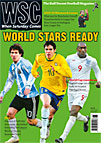 Events on the pitch in Italy were overshadowed by a bribery scandal involving several top clubs. Matthew Barker looks back on a memorable season in Serie A
Events on the pitch in Italy were overshadowed by a bribery scandal involving several top clubs. Matthew Barker looks back on a memorable season in Serie A
The long-term significance
The fallout from the Calciopoli bribery scandals has yet to settle, with a number of phone-tap recordings surfacing in recent months. Inter, at the centre of new (unproven) accusations, are under increasing pressure to relinquish the 2005-06 Scudetto, awarded to them after it was stripped from Juventus. The bianconeri’s title from the 2004-05 season stands in the record books as void. The original sentencing was announced on July 14, 2006, less than a week after the Azzurri lifted the World Cup in Berlin. Of the top-tier clubs involved, Juventus were sent down to Serie B with a nine-point (originally 30-point) deduction for the following season. Lazio and Fiorentina’s points deductions were increased on appeal, from seven to 11 and 12 to 15 respectively, though both original punishments had included demotion to the second division. Reggina were deducted 11 points (originally 15), while Milan were docked eight (44) and, following an appeal, allowed into the following season’s Champions League, which they then went on to win.
Story of the season
Juventus led the table from the first day and lost just once, away to Milan. Coach Fabio Capello preferred a David Trezeguet-Zlatan Ibrahimovic pairing in a generally uninspiring 4-4-2, enduring a frosty relationship with Alessandro Del Piero. However, with new signing Patrick Vieira and Pavel Nedved in midfield, they were a solid, balanced unit and by the midway point had established a ten-point lead. Come the final round of games, Milan had closed the gap to three, but Juve held their nerve. The title was won on the final day, with a 2-0 victory at Reggina. Their 29th Scudetto, it left them just one title short of a third gold star (worn on the club shirt and awarded for every ten championships won).
Inter, who spent most of the season jostling with their city neighbours for second place, were always very vocal about perceived favours towards Juventus from match officials. “Why should we be surprised?” nerazzurri club president Giacinto Facchetti asked journalists at the turn of the year. “Juve have so many resources to draw on.”
The scandal overshadowed some impressive showings from various provinciali clubs. Chievo, under coach Giuseppe Pillon, were bumped up to a Champions League qualifying round after originally ending the season in seventh, while Livorno, having finished a creditable ninth, earned a UEFA Cup place for the first time (joining them in the competition were Palermo and Parma). Both Empoli and Ascoli had decent campaigns too, finishing 11th (eighth after sentencing) and 12th (tenth) respectively.
Gianluca Pessotto, having played his last game for Juventus earlier in the season, was appointed team manager. In late June, while Italy were still celebrating their place in the World Cup quarter-finals, the former midfielder was involved in an apparent suicide bid after throwing himself off the roof of the club’s offices in Turin.
For the record books
Capocannoniere Luca Toni was awarded the Golden Shoe after his 31 goals for Fiorentina. Toni’s tally made him the first Italian since Felice Borel, back in 1934, to score more than 30 in a season.
Same place today
Thirteen clubs are still in Italy’s top division, with Siena and Livorno both relegated this summer and Lecce promoted back up from Serie B. At the time of writing, only one coach, Fiorentina’s Cesare Prandelli, remains in the same job.
Moved furthest away
Juventus took the place of Messina in the bottom three, but the Sicilians were duly relegated the following season. In 2008, debt-ridden and with no potential buyers, they were forced to start all over again in Serie D. Having played their first and so far only season in Serie A, Treviso suffered similar financial collapse and now appear in the Eccellenza Regionale league.
From WSC 280 June 2010